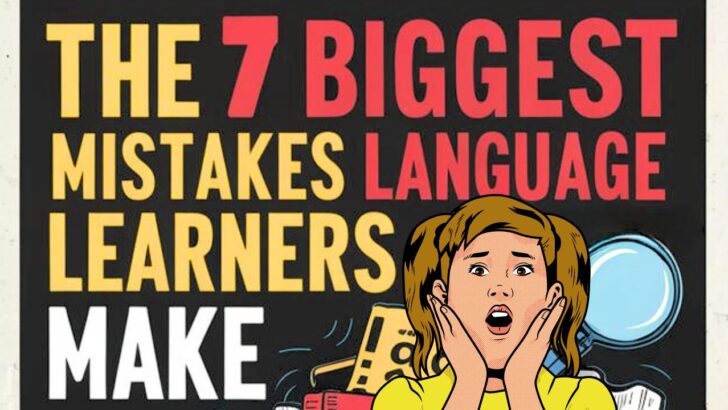Learning a new language is like dating—exciting, full of potential, and occasionally frustrating. To help you avoid the classic pitfalls of language learning, we’ve compiled a list of the seven biggest mistakes learners make. By steering clear of these, you’ll be chatting away like a local in no time.
Mistake #1: Studying a Language for the Wrong Reason
Imagine signing up for a marathon just because your friend did, without really caring about running. That’s what it’s like studying a language for the wrong reason. If you’re learning French solely because you think it sounds fancy, but have no real passion for it, you’re in for a rough ride.
Find a reason that lights a fire in you—be it the dream of ordering croissants in Paris like a pro or binge-watching telenovelas without subtitles. Passion is your fuel. Without it, you might stall out before you even get started.
Mistake #2: Neglecting Consistent Practice
Consistency in language learning is like brushing your teeth—skip a few days, and things start to get ugly. Many learners head into learning with enthusiasm only to fizzle out after a week. Don’t be that person! Make language practice a daily habit. Even just 15 minutes a day can make a world of difference. Think of it as watering a plant; it needs regular attention to grow, not a flood once a month.
Mistake #3: Hanging Out with the Wrong Crowd
Surround yourself with people who are as motivated as you are to learn the language. If you’re in a country where the target language is spoken, but your friends prefer chatting in their native language (or English as the lingua franca), you’re missing out. Similarly, if you hang out with people who are far more fluent, you might find yourself staying silent while they do all the talking.
Instead, find a group that matches your level and is eager to practice. And don’t just limit yourself to fellow learners—hanging out with locals is a fantastic way to truly immerse yourself in the language. It’s like being in a band; you all need to play your parts to create harmony.
Mistake #4: Avoiding Speaking Practice
Ah, the classic “I’ll practice speaking when I’m perfect” trap. Spoiler alert: perfection doesn’t exist. Avoiding speaking practice is like buying a guitar and never strumming it because you’re scared of hitting the wrong note. Mistakes are part of the process. Jump in, make those hilarious blunders, and learn from them. Find a language buddy, join a conversation group, or talk to yourself in the mirror—whatever gets your tongue moving.
Mistake #5: Relying Solely on Textbooks
Textbooks are like training wheels—they’re helpful, but you won’t win any races with them. If you rely only on textbooks, you’ll miss out on the vibrant, living aspects of the language. Mix it up! Read the news, scroll through social media, watch vlogs, or eavesdrop on conversations at your favorite coffee shop. This exposure helps you understand how the language is used in the wild, complete with slang and cultural peculiarities.
Mistake #6: Not Setting Realistic Goals
Setting the goal of becoming fluent in Japanese in three months is like deciding to climb Everest next weekend—it’s not gonna happen. Unrealistic goals lead to disappointment and the urge to throw in the towel. Instead, set small, achievable milestones. Celebrate each victory, whether it’s remembering how to order sushi or understanding a song lyric. Progress is progress, no matter how small.
Mistake #7: Ignoring Cultural Context
Learning a language without its cultural context is like swimming without water. Language and culture are inseparable. Immerse in the culture of the language you’re learning—watch their films, celebrate their holidays, learn about their history.
This not only makes your learning richer but also more meaningful. Plus, you’ll have some great conversation starters when you chat with native speakers.
By avoiding these common mistakes, you can make your language learning journey more fun, effective, and rewarding. Remember, learning a language is an adventure, not a chore. Embrace the challenge, enjoy the ride, and soon you’ll be impressing everyone with your newfound skills!

Hey fellow Linguaholics! It’s me, Marcel. I am the proud owner of linguaholic.com. Languages have always been my passion and I have studied Linguistics, Computational Linguistics and Sinology at the University of Zurich. It is my utmost pleasure to share with all of you guys what I know about languages and linguistics in general.

